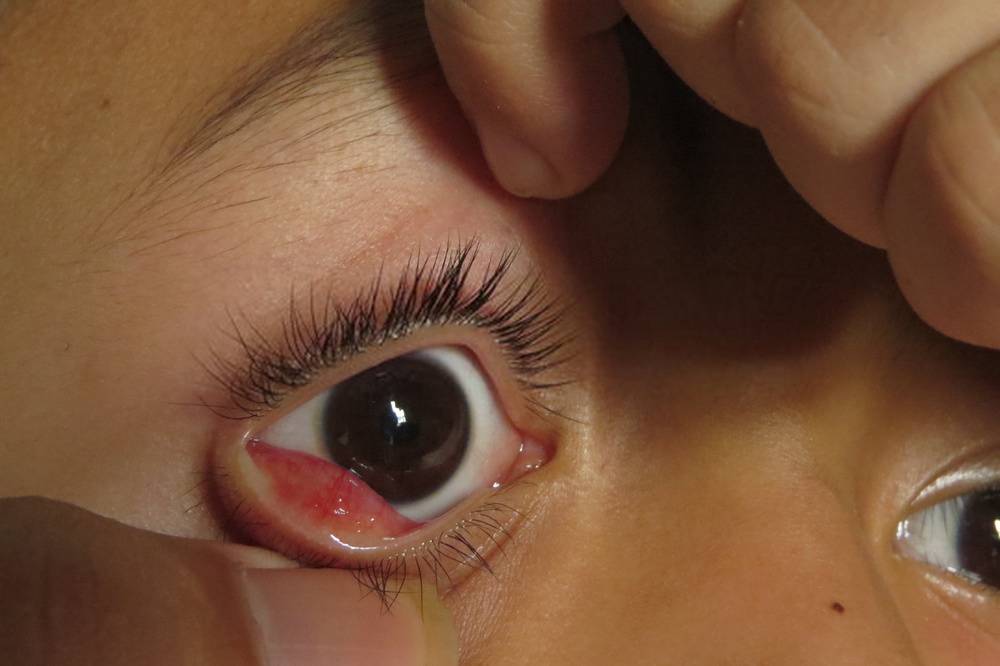Last Updated on 3 weeks ago by Nicky Johnson
We all know that dry eyes can be uncomfortable, but did you know it could also cause more severe problems? People who suffer from it may not adequately clean their eyes with regular eye drops, increasing the risk of developing an infection. But even if you haven’t contracted a disease so far, dry eyes can still damage your cornea and lead to an increased risk for cataracts later on in life.
As with many conditions, many causes lead to the development of dry eyes. A common culprit is Conjunctivochalasis.

What is Conjunctivochalasis?
Blog Contents
Conjunctivochalasis is a common cause of dry eyes, but many people may not understand it. Conjunctivochalasis is an eye disease that causes the tissue around your eyelids (called the conjunctiva) to become thin and fold over the edge of your eyelids. As a result, you can see a whitish or gray ring on the edges of the eyelids. In time, the folds can become so big that they will block some of your vision because of excess skin around your eyes.
How To Recognize Conjunctivochalasis?
The white or gray ring around your eyelids is a vital sign of conjunctivochalasis. Also, if you notice your eyes are dry, even if they are getting some normal tears, you may suffer from conjunctivochalasis.
The tears won’t be able to flow very well and can even cause crusts around your eyes. Just knowing that you have conjunctivochalasis does not mean that you’re going to receive any treatment. It is essential to consult a doctor if you suspect that you have the disease. Several treatments for conjunctivochalasis can help your dry eyes, but you’ll need to prevent them from developing.
How To Solve Dry Eyes Caused by Conjunctivochalasis?
Sometimes, conjunctivochalasis can be treated by using lubricating eye drops. If your doctor finds that dry eyes cause your condition, they can use eye drops containing artificial tears or some other type of eye drops specifically formulated to treat dry eyes. If the conjunctivochalasis is related to any other cause, you may benefit from using a different eye drop. Your doctor will be the best person to suggest the right course of treatment for you.
If dry eyes do not cause your condition, your doctor may advise you to treat your disease with lifestyle changes. For example, if you smoke or overeat spicy food, these habits can worsen your conjunctivochalasis. So, if you want to solve your dry eyes and conjunctivochalasis, you’ll have to make some lifestyle changes too.
Do Eye Infections Cause Dry Eyes?
If you notice that your condition has worsened over a short period, you may have an infection in your conjunctiva. Contrary to what most people feel about eye infections, this type of infection can be severe. If your eye infection is not treated in time, it can lead to a severe type of conjunctivitis and even an eye disease called trachoma. Trachoma is the leading cause of blindness in the world, and infections like conjunctivitis cause it. So, if you notice that your dry eyes are getting worse, check with your doctor.
If you’re currently suffering from a severe eye infection, you should immediately take the proper treatment. Waiting too long to treat a severe eye infection can lead to many complications that can cost you your sight forever. So, you should always seek help if you suspect that your eye infection may cause your dry eyes. Vigilance is the best way to deal with any eye infection, but sudden changes in your vision can be undeniable. If you suspect that an eye infection has caused a problem in your sight, discuss it with your doctor right away.
Conjunctivochalasis can seriously damage the cornea of the eye and lead to progressive cataracts later in life. Therefore, it is crucial to prevent dry eye and conjunctivochalasis from occurring. If you’re suffering from mechanical dry eyes and you want to prevent them from worsening, talk to your doctor about the cause of your eye infection and why you need the proper treatment.
What Can You Do to Help Dry Eyes?
Although conjunctivochalasis is a widespread condition, it is essential to understand that it is not the only condition that can cause dry eyes. There are many other causes of dry eyes, such as allergies and styes. Therefore, if you believe you have the right symptoms for dry eyes, consult a doctor to diagnose your condition.
If your doctor suspects that your dry eyes are caused by conjunctivochalasis, they will recommend a suitable treatment for your symptoms and concerns. Eye drops are the most common treatment of dry eyes caused by conjunctivochalasis. Eye drops containing artificial tears are the best treatment for this condition. They may also use Prokera cryopreserved amniotic membrane to give the eyes enough room for faster and effective healing of the cornea.
If your doctor thinks another kind of eye drop is more appropriate for you, they recommend the proper treatment. For example, if you don’t use eye drops regularly, you may find that it causes some burning sensation around your eyes. If that is the case, your doctor will recommend eye drops to relieve dry eyes, causing no discomfort.
Wrapping Up
Mechanical dry eyes are a common cause of vision impairment in the world. It can affect people of all ages, but it is most commonly found in people over 60 years old. If you’re suffering from mechanical dry eyes, try to find the cause of your condition and get the proper treatment.
If you feel your conjunctivochalasis is getting worse or if you suspect that an eye infection has caused a problem in your vision, consult an eye doctor. The doctor will discover the mechanical dry eye, the cause, and provide a way forward. They will help you decide whether an eye infection is causing your dry eyes and what treatment is best for your condition.







